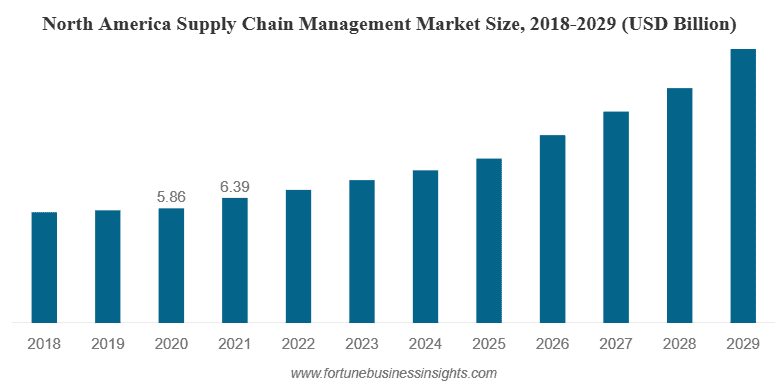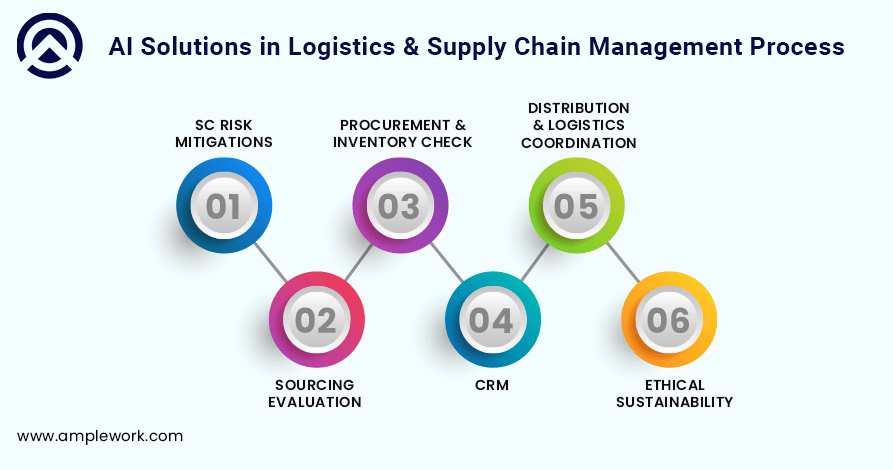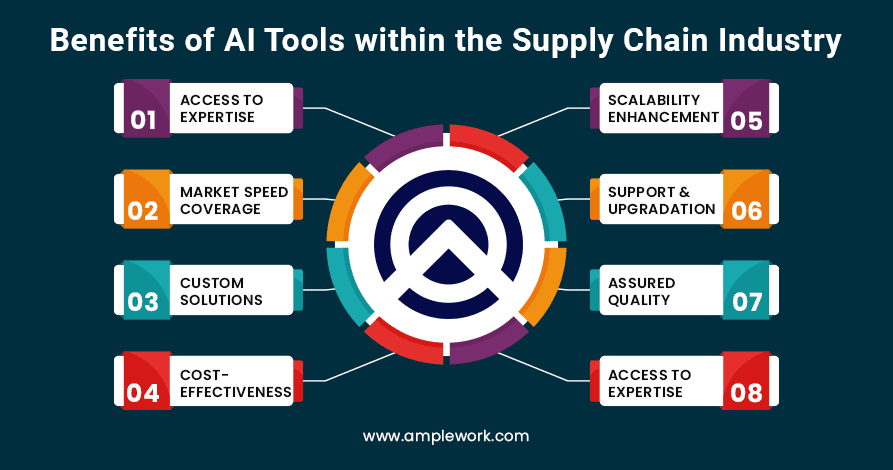Implementing AI in Logistics and Supply Chain Management
We can expect that the emergence of Artificial Intelligence is in every sector and provides ease. AI applications hold the power to reform any sector completely. While taking into consideration the Logistics and Supply Chain Management (L&SCM) sector, AI-aided assets are making many advancements. These AI-aided applications have opened many pathways for the inventory and supply chain management sector. In the current times, these generative AI development assets are robotic process automation or collaborative robots, speech recognition, advanced techniques of computer vision, machine learning, natural language processing, and deep learning.
All these highly advanced techniques assure the best outcomes according to the requirement or more than that. We can expect many benefits from such applications, these are the development of dynamic capabilities within this sector, restructuring of organizations, novel improvisation for value creation, establishment of flexible policies, and development of innovative processes. The research data by Fortune Business Insight highlights the same aspect of AI in logistics and supply chain management. Integrating AI into supply chain management is a vital aspect of our Enterprise Solutions, enhancing efficiency and reducing operational complexities.

As shown in the above figure, the market size of the global supply chain market was valued at USD 21.26 billion in 2022. Which is projected to grow with a value of USD 47.29 billion by 47.29 billion. Along with this, it estimates a compound annual growth rate of 12.1% within the timeframe of 2022 to 2029. This indicates that the inventory and supply chain industry is continuously advancing and bringing many new assets that are worth implementing in this technically advanced era.
Blog Highlights
This blog is all about exploring the assets of AI in logistics and supply chain management in which we are covering everything in two sections. The first one highlights the benefits of implementing AI-aided tools within the L&SCM practices. The second section highlights the strategies by which we can incorporate AI into the procedures of the supply chain. Let’s explore how these AI assets can provide tips for managing small businesses.
AI solutions in Logistics & Supply Chain Management Process

1. Supply Chain Risk Mitigations
The level of handling risks for generative assets is quite high as compared to the other risk management assets. These risk management assets are capable of handling political, economic, cultural as well as partner risks. These AI tools are capable of assisting in scenario-based risk assessments with the help of further mentioned factors. These are a generation of potential disruption models, involvement of incidences like supplier insolvency, natural calamities, strikes, pandemics, and other factors. With such risk analysis, organizations can make risk mitigation strategies and practices. During these risk disruptions, AI-aided tools can generate viable alternatives based on several factors based on traditional supply chain practices.
2. Sourcing Evaluation
These applications of AI work on selecting and evaluating suppliers that result in revolutionary results. Generative AI’s application in supplier evaluation and selection introduces a groundbreaking method, outpacing traditional manual approaches. By swiftly analyzing extensive data from numerous suppliers and considering diverse parameters like cost, quality, reliability, efficiency, and sustainability, AI creates an optimal supplier portfolio. It also promotes inclusivity by suggesting strategies to incorporate minority, women, and veteran-owned businesses into the supply chain. Leveraging its text generation capability, AI offers detailed insights into each supplier’s strengths and weaknesses. Moreover, it assists in devising negotiation strategies and contractual terms based on historical data and anticipated supplier behavior, streamlining the process.
3. Procurement & Inventory Check
Generative AI’s predictive capabilities enhance demand and sales forecasting accuracy, empowering companies to optimize their ordering schedules and quantities from suppliers. This fosters lean management, reducing waste and boosting resource and process efficiency. Beyond traditional demand prediction. Generative AI development services can design adaptable inventory policies, optimizing costs associated with excess or insufficient stock. For example, it can devise just-in-time inventory management strategies, potentially reducing storage expenses and improving cash flow.
4. Customer Relationship Management
Customers are the primary asset of every business. Prioritizing them leads to effective supply chain and inventory management. Generative AI finds utility as chatbots in the consumer sector, automating interactions with customers. This includes delivering personalized updates on order status, estimated delivery times, and resolving inquiries or complaints. The result is an improvement in customer satisfaction, overall experience, service quality, and retention rates. Moreover, these sophisticated models assist in devising customized marketing. And sales strategies for specific customer segments, products, or regions, leveraging predictive analysis of consumer data and market trends.
5. Distribution & Logistics Coordination
Taking care of these major features of the supply chain industry AI applications can bring advancements in many ways. Generative AI plays a crucial role in crafting efficient distribution strategies and logistic distribution solution routes, considering various factors like cost, service level, disruptions, weather, and environmental concerns. It also devises contingency plans for potential disruptions such as traffic or severe weather. By analyzing real-time data like traffic, weather, vehicle details, and fuel costs, AI optimizes transportation routes, minimizing travel time and fuel usage. For instance, it can plan routes for delivery trucks with multiple stops in a city to enhance efficiency. Additionally, AI provides explanations for selected routes, empowering logistics managers with better decision-making capabilities. Furthermore, with specific constraints and requirements, generative AI designs optimal layouts for warehousing activities, incorporating factors such as demand frequency, product dimensions, and storage capacities.
6. Ethical & Sustainable Practices
AI-aided solutions are effective in many ways and the development of supply chain applications based on AI is capable enough to bring many changes in the traditional process. Through optimizing logistical routes, minimizing warehousing needs, and enhancing resource efficiency, AI contributes to reducing companies’ carbon footprint and advancing sustainability goals. AI models can assess the social and environmental impacts of sourcing from various suppliers, helping businesses prioritize fair trade and ethical sourcing practices.
Additionally, these models can be utilized to plan logistics & distribution services, ensuring accessibility for underserved communities, especially in critical sectors like healthcare and food supply during both regular and crises. For instance, a mobile application development company might utilize generative AI to ensure a responsible supply chain. The AI could analyze data from supplier audits, regulatory filings, and media reports to identify potential compliance risks. Upon identifying a risk, such as a supplier violating labor laws, the AI could recommend responses like thorough audits, seeking alternative suppliers, or collaborating with current suppliers to address the issue effectively.
Also Read: Leveraging AI for Enhanced Inventory Management in Retail
Benefits of AI Tools within the Supply Chain Industry

1. Access to Expertise
Imagine having a seasoned supply chain guru living in your pocket, whispering strategic insights day and night. That’s the magic of AI! It devours your data ocean, unearthing hidden patterns and trends invisible to the human eye. Then, like a wise advisor, it translates this knowledge into actionable recommendations. Need to predict demand fluctuations? AI’s got your back. Facing potential disruptions? It warns you before they hit. Think of it as having a personalized supply chain sherpa, guiding you through complex landscapes with expert-level insights, all without the exorbitant consulting fees. It’s not just data analysis, it’s strategic foresight delivered on-demand, empowering you to make informed decisions that optimize your entire supply chain.
2. Market Speed Coverage
AI tools within the supply chain industry ensure swift adaptation to market dynamics by providing real-time data insights. These tools leverage predictive analytics and automated processes, enabling businesses to quickly respond to changes in demand, supply, or market trends. This enhances agility and competitiveness by optimizing inventory levels, improving operational efficiency, and reducing costs. Additionally, AI-driven supply chain solutions enhance decision-making by providing actionable insights into complex data sets. Overall, integrating AI tools into the supply chain transforms traditional operations into intelligent, data-driven processes, positioning businesses to thrive in today’s dynamic marketplace.
3. Custom Solutions
AI empowers supply chain businesses to tailor solutions to their specific needs with unprecedented precision. Through sophisticated machine learning algorithms and advanced data analytics, companies can harness the power of vast data sets to identify intricate patterns and optimize operations. This analytical prowess enables the development of personalized strategies that are finely tuned to address unique challenges and capitalize on individual opportunities within the supply chain ecosystem. By leveraging AI-driven insights, businesses can achieve enhanced efficiency, reduced costs, and improved decision-making capabilities, ultimately gaining a competitive edge in today’s rapidly evolving marketplace.
4. Cost-Effectiveness
The implementation of AI tools in the supply chain represents a transformative leap towards streamlined processes, efficiency enhancement, and cost reduction. By automating mundane tasks, predicting maintenance needs, and optimizing resource allocation, businesses can achieve remarkable improvements in operational efficiency. This automation not only reduces labor-intensive processes but also minimizes errors and delays, resulting in smoother operations and enhanced productivity. Moreover, predictive maintenance helps prevent costly equipment breakdowns, ensuring uninterrupted workflow and minimizing downtime. The optimized resource allocation further contributes to significant cost savings over time, bolstering the bottom line and fortifying the financial health of the organization. In essence, integrating AI into the supply chain landscape represents a strategic investment with substantial long-term benefits.
5. Scalability Enhancement
AI plays a pivotal role in enabling scalable operations within the supply chain by automating repetitive tasks and seamlessly adapting to changing demands. Through the utilization of machine learning algorithms, businesses can efficiently manage fluctuations in production volume, logistics transportation and distribution needs, and market expansion. This adaptability ensures that operations remain smooth and efficient, even as the scale of operations increases. By leveraging AI-driven insights, businesses can proactively address scalability challenges, optimizing resource utilization and enhancing overall operational efficiency. The ability to scale operations seamlessly and efficiently positions businesses to meet growing demands and capitalize on emerging opportunities, driving sustainable growth in the competitive market landscape.
6. Support & Upgradation
AI tools provide indispensable support and continuous improvement, ensuring that supply chain management and inventory management systems remain optimized and up-to-date. Through regular updates, enhancements, and personalized assistance. Businesses can harness the full potential of the latest technologies. And methodologies to stay ahead in a rapidly evolving industry landscape. These AI-driven advancements enable businesses to adapt swiftly to changing market dynamics, emerging trends, and evolving customer demands. By staying abreast of the latest innovations and best practices, organizations can enhance operational efficiency, improve decision-making processes, and drive sustainable growth. The ongoing support and upgradation offered by AI tools are not only future-proof supply chain operations. But also empower businesses to maintain a competitive edge in today’s dynamic business environment.
7. Assured Quality
AI serves as a cornerstone for quality control within the supply chain, revolutionizing the way anomalies are detected, potential issues are predicted, and processes are optimized for consistency and precision. Through the utilization of advanced analytics and machine learning algorithms. Businesses can maintain stringent standards of product quality, regulatory compliance, and customer satisfaction across the entire supply chain journey. AI-driven quality control mechanisms enable proactive identification and mitigation of deviations, thereby minimizing the risk of defects, recalls, and non-compliance issues. This not only safeguards brand reputation but also fosters customer trust and loyalty. By continuously refining processes based on real-time insights. Businesses can achieve unparalleled levels of quality assurance and operational excellence, driving sustainable growth and competitive advantage in the global marketplace.
Conclusion
In the realm of revolutionizing the retail sector with AI, from personalization to supply chain optimization, a significant transformation is underway. Tailored and cost-effective AI solutions designed for diverse markets are streamlining business interactions and transactions. The increasing demand for these efficient platforms is driving a surge in the number of AI developers and specialized organizations. Numerous startup projects have successfully navigated initial challenges. Establishing positive reputations and continuously adapting to the evolving needs of retail operations.
Amplework proudly stands out as a reputable AI development Company with over 5+ years of extensive experience in leveraging AI for retail transformation. Spanning from personalized customer experiences to optimized supply chain processes. Our team consistently exceeds client expectations, having completed numerous development projects. Our unwavering commitment to reliability and trustworthiness has translated into a remarkable milestone. With our AI solutions facilitate seamless business interactions and transactions in the retail landscape. Explore our website!



 sales@amplework.com
sales@amplework.com
 (+91) 9636-962-228
(+91) 9636-962-228





